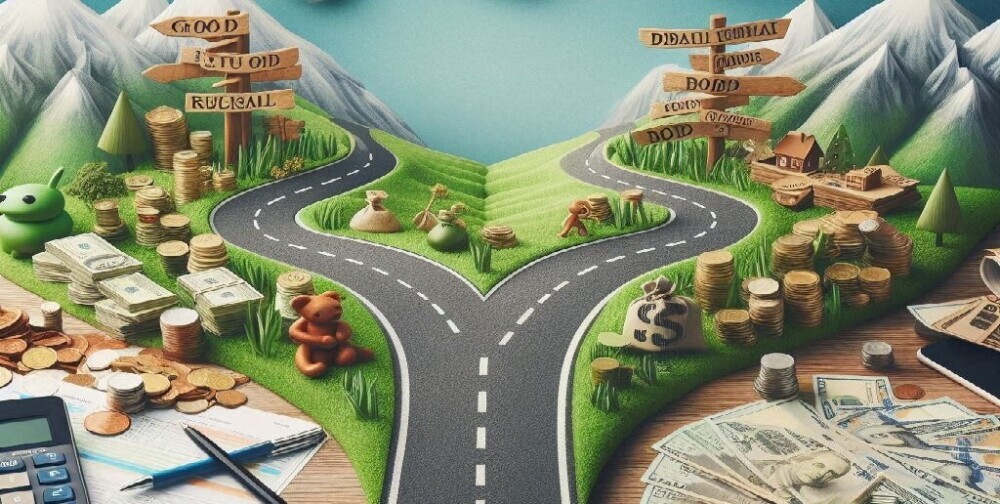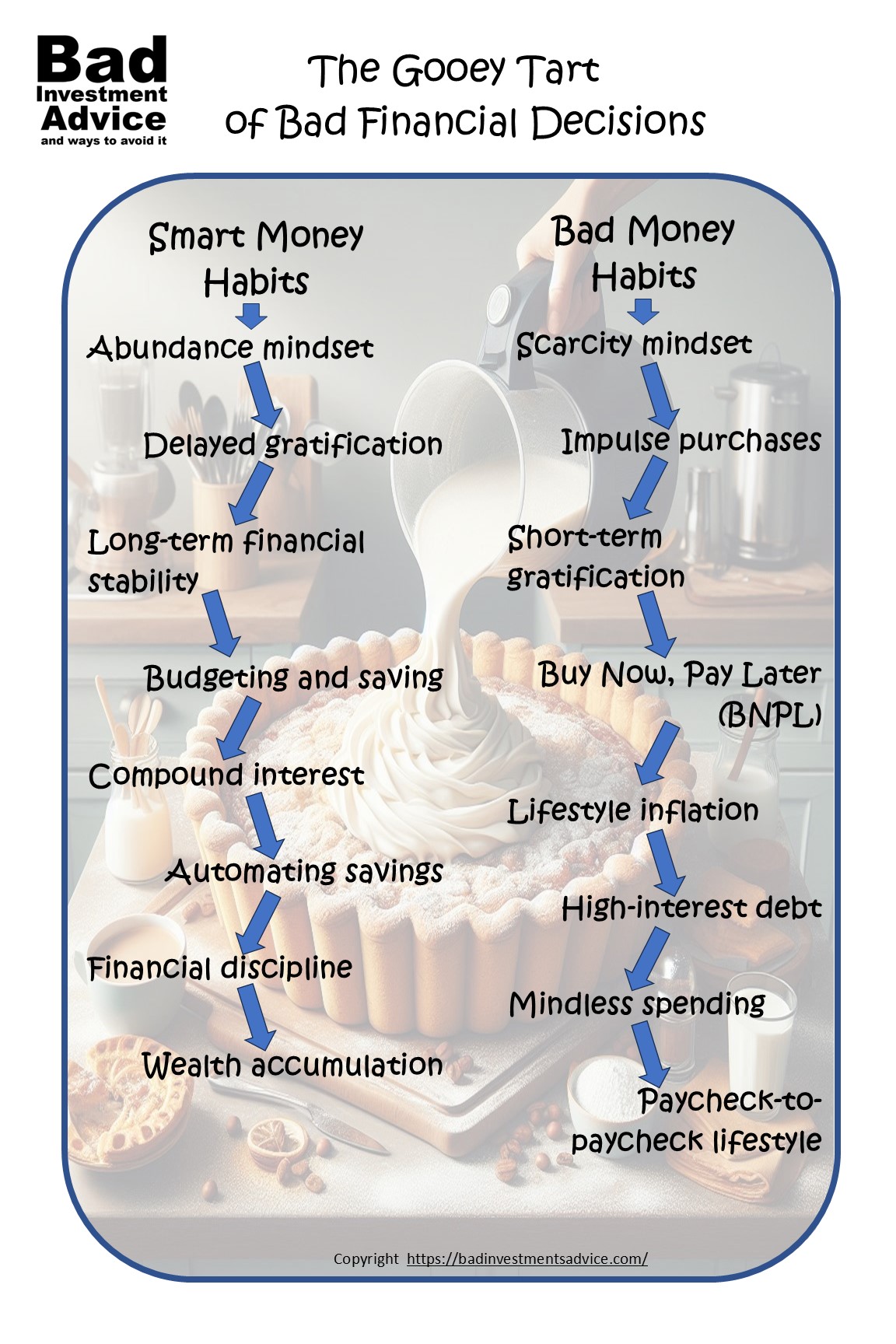
The gooey tart of bad financial decisions and why short-term gratification costs you….
Have you ever walked past a bakery, caught the irresistible scent of a freshly baked tart, and bought one on impulse—only to later realize you didn’t really need it? While that gooey, sweet indulgence was delightful in the moment, it didn’t serve your long-term health goals. The same principle applies to financial decisions. Many people fall into the trap of short-term gratification, making impulsive choices that feel good in the moment but lead to long-term financial strain. Let’s take a closer look at how these habits shape your financial future and how to develop a more sustainable money mindset.
The Sticky Sweetness of Impulse Purchases
Impulse purchases are one of the most common financial pitfalls. That sudden desire to buy something unplanned—whether it’s a trendy gadget, an expensive coffee, or a luxury item on sale—can be incredibly tempting. Marketers know this and use psychological tricks, such as limited-time offers, scarcity tactics, and emotional appeal, to encourage unplanned spending.
These small, seemingly harmless purchases may not feel like a big deal individually, but over time, they add up. The extra $5 on coffee each day, the frequent Amazon orders, and the seasonal wardrobe refreshes can slowly erode your savings and limit your ability to invest in long-term goals. A $20 impulse buy here and there may seem insignificant, but over the course of a year, it could add up to thousands of dollars.
One way to combat impulse spending is by implementing a 24-hour rule—if you see something you want, wait a full day before making the purchase. Often, the initial excitement fades, and you realize you don’t actually need it. Another method is to set a discretionary spending budget to enjoy small indulgences without going overboard.
The Hidden Cost of Short-Term Gratification
It’s easy to justify spending money on things that bring immediate pleasure, especially when life feels stressful or monotonous. Buying something new, treating yourself to a fancy dinner, or upgrading to the latest smartphone provides an instant dopamine hit. However, choosing short-term rewards over long-term financial stability can have serious consequences.
One of the biggest dangers of short-term gratification is accumulating high-interest debt. Credit card balances that aren’t paid in full can quickly spiral out of control, leading to mounting interest payments and financial stress. Similarly, Buy Now, Pay Later (BNPL) services can create the illusion of affordability while pushing people further into debt.
Another hidden cost is lifestyle inflation. As income grows, people often increase their spending instead of saving or investing more. A higher salary leads to a bigger house, a nicer car, and more luxurious vacations—all of which feel justified but can prevent wealth accumulation. Recognizing the emotional triggers behind spending can help break this cycle and shift focus toward long-term financial health.
How Small Financial Habits Shape Your Future
Your financial future isn’t shaped by a single big decision—it’s the result of daily habits, both good and bad. Just like compound interest grows investments over time, consistent financial habits can either build wealth or drain it. Here is another article that looks into the benefits of compound interest for long-term investments.
Mindless spending on non-essentials can easily become a habit, leading to a paycheck-to-paycheck lifestyle. On the other hand, mindful saving, budgeting, and investing can set you up for long-term financial security. Simple changes, such as automating savings, tracking expenses, and setting spending limits, can make a big difference.
For example, consider someone who invests $200 per month into an index fund starting at age 25. With an average annual return of 7%, they could accumulate over $500,000 by retirement. Meanwhile, another person who spends that $200 on impulse purchases each month has nothing to show for it. The key takeaway? Small financial decisions, repeated over time, have a significant impact.
Regularly reviewing your finances—such as checking your bank statements, analyzing your expenses, and adjusting your budget—keeps you accountable. Awareness is the first step toward making intentional, informed decisions about your money.

Creating a Sustainable Money Mindset
Developing a sustainable money mindset is about shifting your perspective from short-term pleasure to long-term financial well-being. This doesn’t mean you have to deprive yourself, but rather that you make intentional choices that align with your financial goals.
One of the most effective ways to cultivate a healthier relationship with money is by shifting from a scarcity mindset to an abundance mindset. A scarcity mindset makes people feel like they need to spend money as soon as they have it, fearing that there will never be enough. An abundance mindset, on the other hand, encourages saving and investing with the belief that financial security is achievable.
Financial self-discipline is another crucial factor. Setting clear financial goals—whether it’s saving for a home, building an emergency fund, or retiring early—helps you stay motivated. Instead of relying on spending for happiness, finding fulfillment in non-monetary aspects of life, such as relationships, hobbies, and personal growth, can reduce the urge to overspend.
Baking a Better Financial Future
Financial success isn’t about avoiding all indulgences—it’s about making consistent, intentional choices. Just as a baker carefully measures ingredients to create the perfect tart, you must be mindful of your financial habits to build a stable and fulfilling future.
Learning from past financial mistakes is essential. If you’ve made poor money decisions in the past, don’t dwell on them—instead, use them as learning experiences to make better choices moving forward. By delaying gratification, avoiding high-interest debt, and cultivating smart money habits, you can achieve greater financial security and freedom.
Ultimately, a well-balanced financial life allows you to enjoy the sweet moments while staying on track with long-term goals. The key is moderation—just like enjoying a tart without overindulging. By developing a sustainable money mindset, you’ll be able to savor life’s pleasures without compromising your financial future.
Affiliate Disclosure: This article contains affiliate links. If you click on a link and buy something, I may receive a commission. You will pay no more so please go ahead and feel free to make a purchase. Thank you!
It has often been said that there is no better investment than your own financial education. One great way to accelerate your financial education and your investing success is with the American Association of Individual Investors, the AAII. When you join the AAII, you get access to reports, courses on investing, risk management, asset allocation, retirement planning, managing retirement finances, and other resources, all for a single annual membership fee.
Single-page Summary
Here is a single-page summary of The Gooey Tart of Bad Financial Decisions. You can download a pdf here.
I hope you found this article interesting and useful. Do leave me a comment, a question, an opinion, or a suggestion and I will reply soonest. And if you are inclined to do me a favor, scroll down a bit and click on one of the social media buttons, and share it with your friends. They may just thank you for it.
You can also subscribe to email notifications. We will send you a short email when a new post is published.
Disclaimer: I am not a financial professional. All the information on this website and in this article is for information purposes only and should not be taken as personalized investment advice, good or bad. You should check with your financial advisor before making any investment decisions to ensure they are suitable for you.
Affiliate Disclosure: This article contains affiliate links. If you click on a link and buy something, I may receive a commission. You will pay no more so please go ahead and feel free to make a purchase. Thank you.


Loved this analogy—sometimes it really does feel like I’ve spent half my life chasing gooey tarts, financially speaking. It’s wild how something so small, like a daily impulse spend, can snowball into long-term setbacks if left unchecked. The idea of baking a better financial future by measuring each decision with care really hit home.
Out of curiosity, what’s one “ingredient” (habit or mindset) you think people overlook most when trying to shift from short-term gratification to long-term financial growth?
Hi and thanks for the comments and question. To my mind the most useful mindset to cultivate is recognizing pleasure and satisfaction from no-cost or low-cost activities. This has worked for me as a way to break the urge to impulse buy. Along side, I would say is considering the money set aside for investment from every pay check as “paying yourself first”. Best regards, Andy
That was a a really clever article. I confess that, even at my age, I find it hard to resist the scent of a freshly baked tart. And few are immune from a little short-term gratification.
It is indeed a rather intriguing disposition of seemingly incongruent concepts. I’m more of a sticky bun person myself, but I’ll definitely go for a gooey tart when such comes along.